An Analysis of the Causes and Effects of the Ebola Epidemic
VerifiedAdded on 2023/06/04
|6
|1348
|222
Essay
AI Summary
This essay provides an overview of the Ebola virus disease, focusing on its causes and effects, particularly during the 2014 outbreak in West Africa. It identifies key factors contributing to the spread of the disease, such as transmission through bleeding patients, insufficient treatment units, and misinformation. The essay further explores the wide-ranging effects of Ebola, including societal impacts like stigmatization, economic decline due to travel restrictions, and the emergence of common mental disorders such as stress, anxiety, and depression. The essay highlights the need for psychological and mental health support systems in affected regions, as well as the importance of addressing the economic and social consequences of the outbreak. The essay concludes by emphasizing the need to understand the initial origin of the virus and the factors that intensified its spread, including the importance of health programs to help those affected by the outbreak.
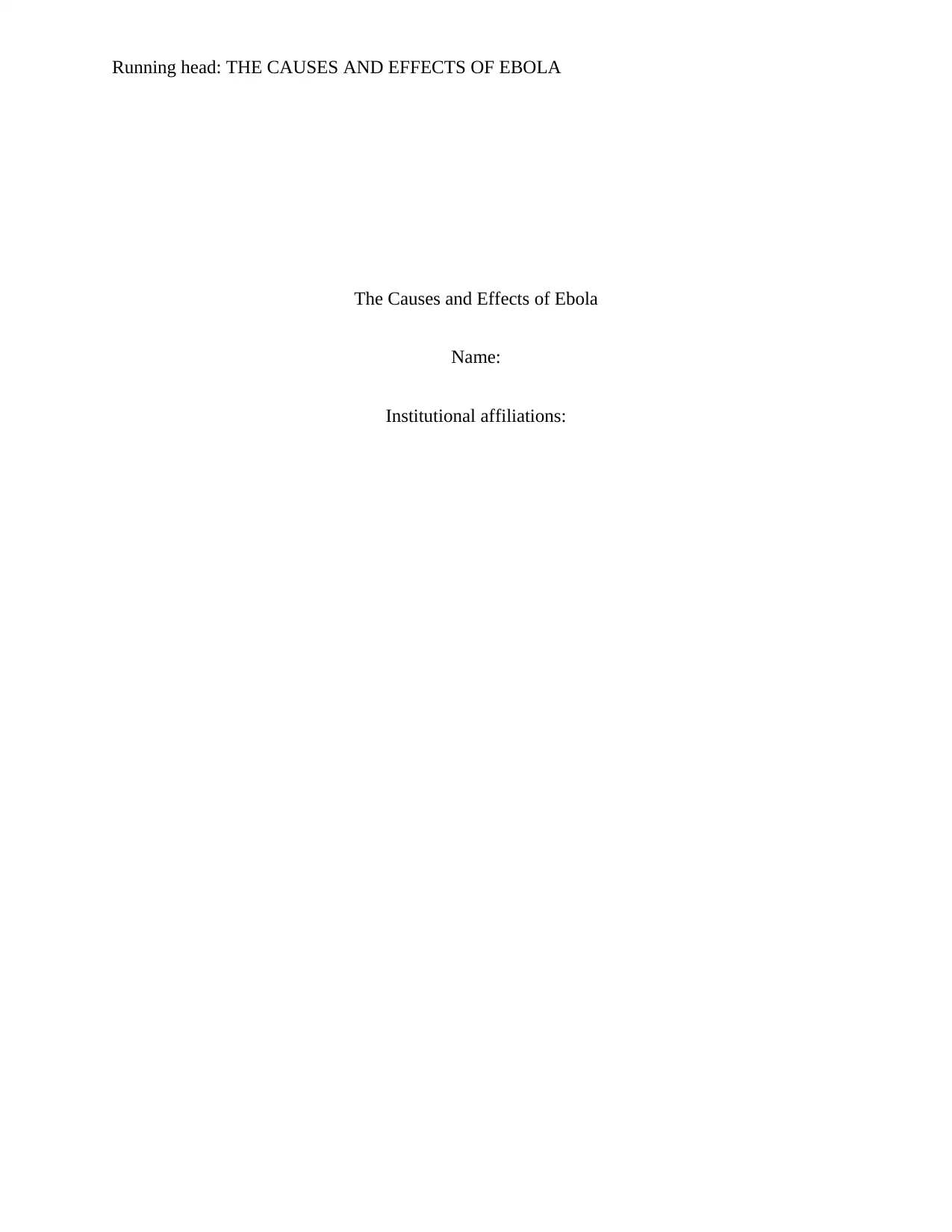
Running head: THE CAUSES AND EFFECTS OF EBOLA
The Causes and Effects of Ebola
Name:
Institutional affiliations:
The Causes and Effects of Ebola
Name:
Institutional affiliations:
Paraphrase This Document
Need a fresh take? Get an instant paraphrase of this document with our AI Paraphraser
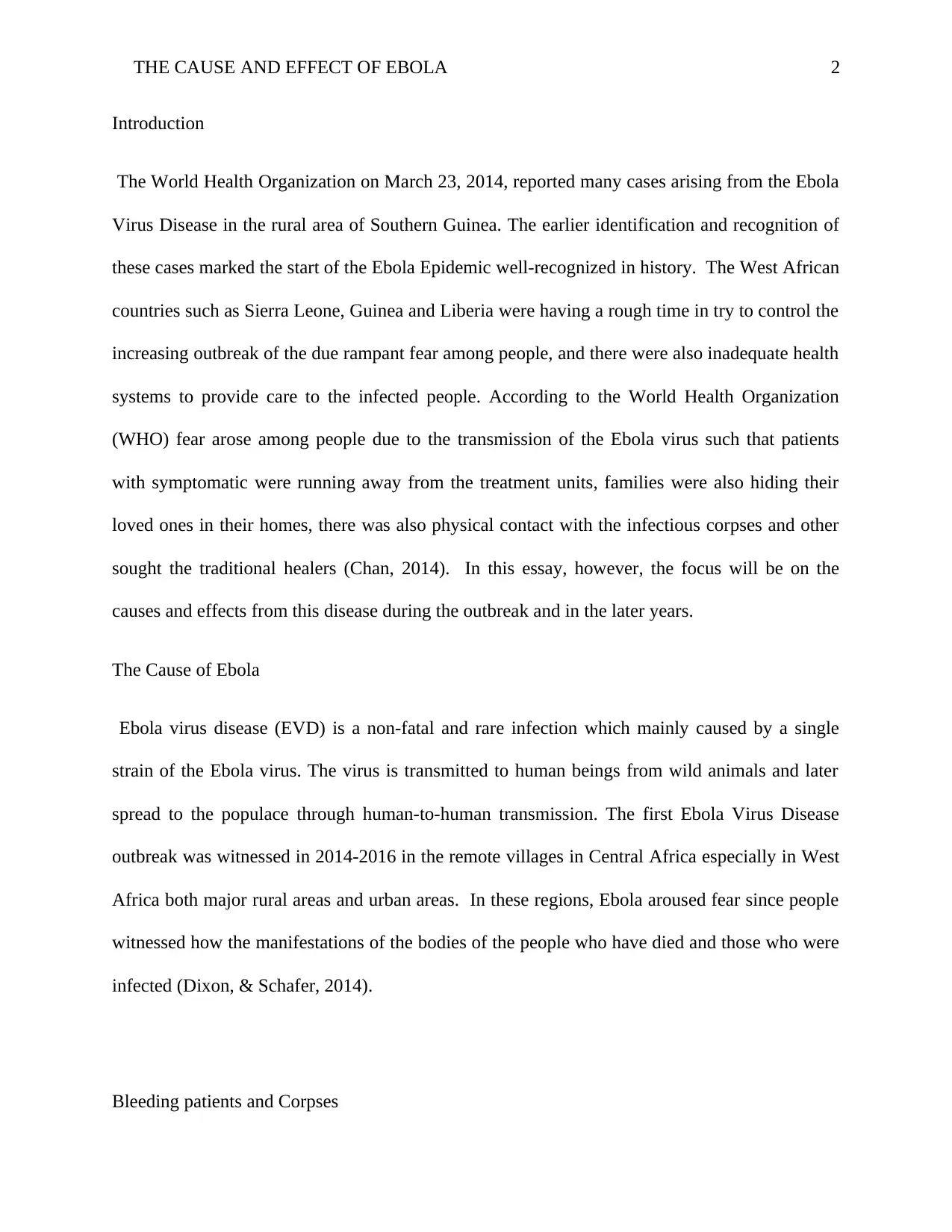
THE CAUSE AND EFFECT OF EBOLA 2
Introduction
The World Health Organization on March 23, 2014, reported many cases arising from the Ebola
Virus Disease in the rural area of Southern Guinea. The earlier identification and recognition of
these cases marked the start of the Ebola Epidemic well-recognized in history. The West African
countries such as Sierra Leone, Guinea and Liberia were having a rough time in try to control the
increasing outbreak of the due rampant fear among people, and there were also inadequate health
systems to provide care to the infected people. According to the World Health Organization
(WHO) fear arose among people due to the transmission of the Ebola virus such that patients
with symptomatic were running away from the treatment units, families were also hiding their
loved ones in their homes, there was also physical contact with the infectious corpses and other
sought the traditional healers (Chan, 2014). In this essay, however, the focus will be on the
causes and effects from this disease during the outbreak and in the later years.
The Cause of Ebola
Ebola virus disease (EVD) is a non-fatal and rare infection which mainly caused by a single
strain of the Ebola virus. The virus is transmitted to human beings from wild animals and later
spread to the populace through human-to-human transmission. The first Ebola Virus Disease
outbreak was witnessed in 2014-2016 in the remote villages in Central Africa especially in West
Africa both major rural areas and urban areas. In these regions, Ebola aroused fear since people
witnessed how the manifestations of the bodies of the people who have died and those who were
infected (Dixon, & Schafer, 2014).
Bleeding patients and Corpses
Introduction
The World Health Organization on March 23, 2014, reported many cases arising from the Ebola
Virus Disease in the rural area of Southern Guinea. The earlier identification and recognition of
these cases marked the start of the Ebola Epidemic well-recognized in history. The West African
countries such as Sierra Leone, Guinea and Liberia were having a rough time in try to control the
increasing outbreak of the due rampant fear among people, and there were also inadequate health
systems to provide care to the infected people. According to the World Health Organization
(WHO) fear arose among people due to the transmission of the Ebola virus such that patients
with symptomatic were running away from the treatment units, families were also hiding their
loved ones in their homes, there was also physical contact with the infectious corpses and other
sought the traditional healers (Chan, 2014). In this essay, however, the focus will be on the
causes and effects from this disease during the outbreak and in the later years.
The Cause of Ebola
Ebola virus disease (EVD) is a non-fatal and rare infection which mainly caused by a single
strain of the Ebola virus. The virus is transmitted to human beings from wild animals and later
spread to the populace through human-to-human transmission. The first Ebola Virus Disease
outbreak was witnessed in 2014-2016 in the remote villages in Central Africa especially in West
Africa both major rural areas and urban areas. In these regions, Ebola aroused fear since people
witnessed how the manifestations of the bodies of the people who have died and those who were
infected (Dixon, & Schafer, 2014).
Bleeding patients and Corpses
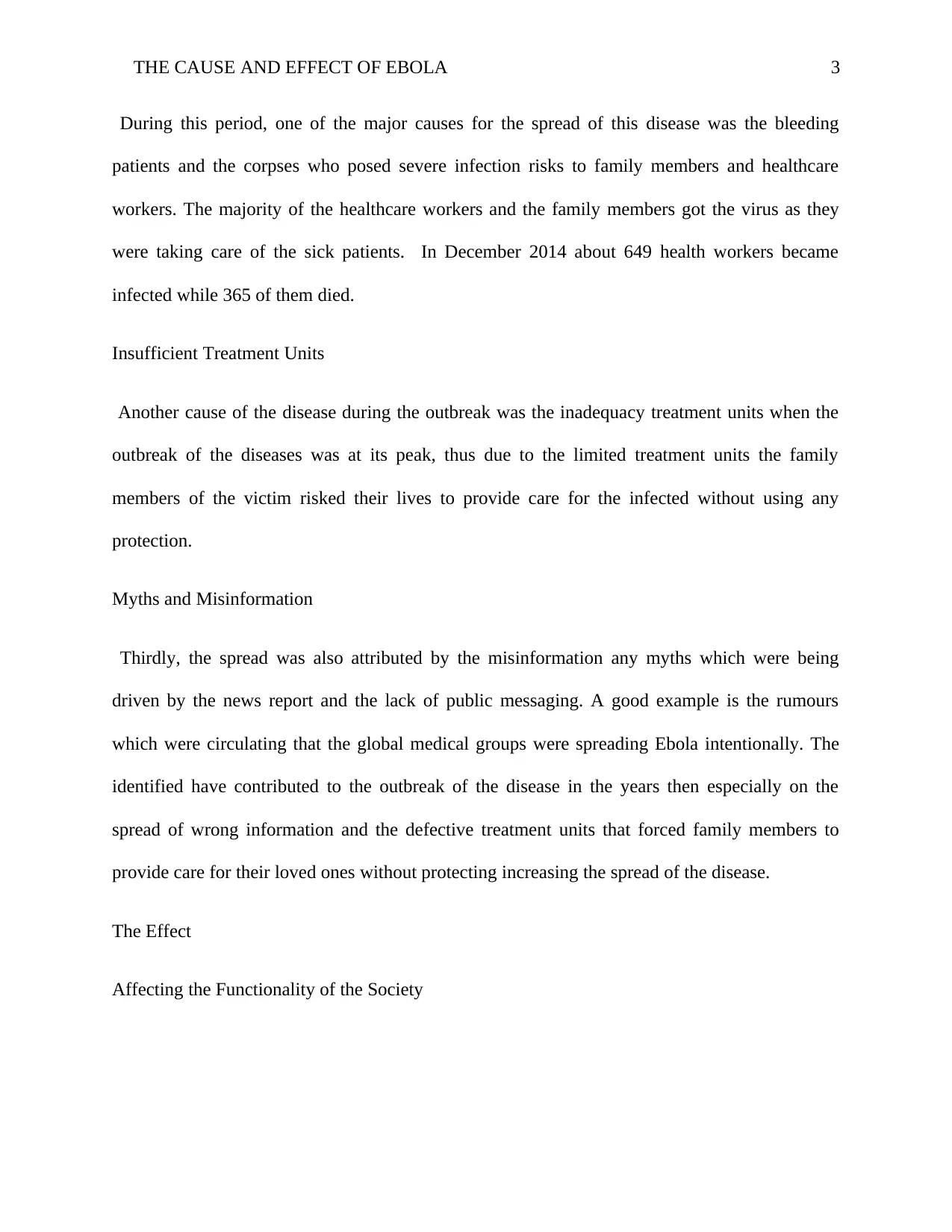
THE CAUSE AND EFFECT OF EBOLA 3
During this period, one of the major causes for the spread of this disease was the bleeding
patients and the corpses who posed severe infection risks to family members and healthcare
workers. The majority of the healthcare workers and the family members got the virus as they
were taking care of the sick patients. In December 2014 about 649 health workers became
infected while 365 of them died.
Insufficient Treatment Units
Another cause of the disease during the outbreak was the inadequacy treatment units when the
outbreak of the diseases was at its peak, thus due to the limited treatment units the family
members of the victim risked their lives to provide care for the infected without using any
protection.
Myths and Misinformation
Thirdly, the spread was also attributed by the misinformation any myths which were being
driven by the news report and the lack of public messaging. A good example is the rumours
which were circulating that the global medical groups were spreading Ebola intentionally. The
identified have contributed to the outbreak of the disease in the years then especially on the
spread of wrong information and the defective treatment units that forced family members to
provide care for their loved ones without protecting increasing the spread of the disease.
The Effect
Affecting the Functionality of the Society
During this period, one of the major causes for the spread of this disease was the bleeding
patients and the corpses who posed severe infection risks to family members and healthcare
workers. The majority of the healthcare workers and the family members got the virus as they
were taking care of the sick patients. In December 2014 about 649 health workers became
infected while 365 of them died.
Insufficient Treatment Units
Another cause of the disease during the outbreak was the inadequacy treatment units when the
outbreak of the diseases was at its peak, thus due to the limited treatment units the family
members of the victim risked their lives to provide care for the infected without using any
protection.
Myths and Misinformation
Thirdly, the spread was also attributed by the misinformation any myths which were being
driven by the news report and the lack of public messaging. A good example is the rumours
which were circulating that the global medical groups were spreading Ebola intentionally. The
identified have contributed to the outbreak of the disease in the years then especially on the
spread of wrong information and the defective treatment units that forced family members to
provide care for their loved ones without protecting increasing the spread of the disease.
The Effect
Affecting the Functionality of the Society
⊘ This is a preview!⊘
Do you want full access?
Subscribe today to unlock all pages.

Trusted by 1+ million students worldwide
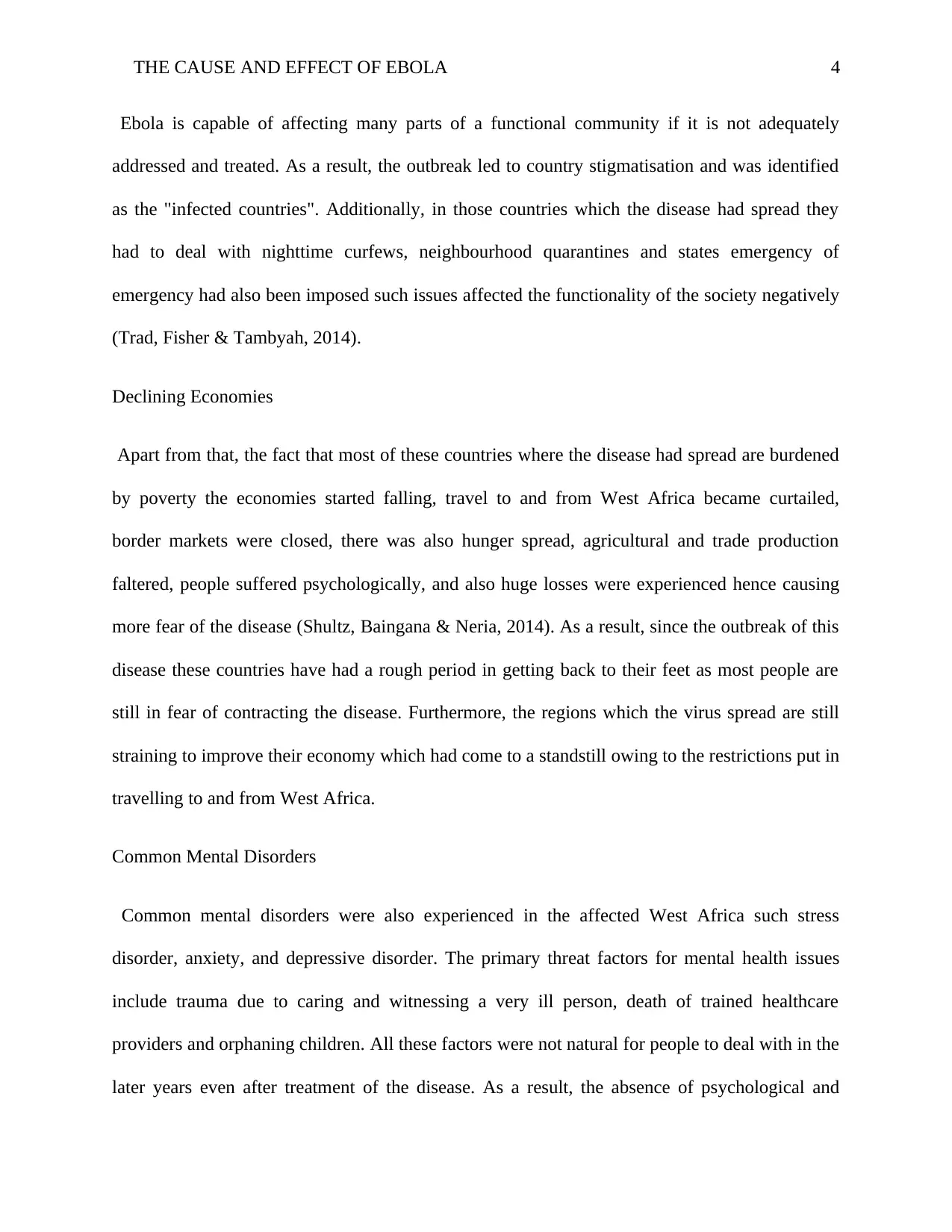
THE CAUSE AND EFFECT OF EBOLA 4
Ebola is capable of affecting many parts of a functional community if it is not adequately
addressed and treated. As a result, the outbreak led to country stigmatisation and was identified
as the "infected countries". Additionally, in those countries which the disease had spread they
had to deal with nighttime curfews, neighbourhood quarantines and states emergency of
emergency had also been imposed such issues affected the functionality of the society negatively
(Trad, Fisher & Tambyah, 2014).
Declining Economies
Apart from that, the fact that most of these countries where the disease had spread are burdened
by poverty the economies started falling, travel to and from West Africa became curtailed,
border markets were closed, there was also hunger spread, agricultural and trade production
faltered, people suffered psychologically, and also huge losses were experienced hence causing
more fear of the disease (Shultz, Baingana & Neria, 2014). As a result, since the outbreak of this
disease these countries have had a rough period in getting back to their feet as most people are
still in fear of contracting the disease. Furthermore, the regions which the virus spread are still
straining to improve their economy which had come to a standstill owing to the restrictions put in
travelling to and from West Africa.
Common Mental Disorders
Common mental disorders were also experienced in the affected West Africa such stress
disorder, anxiety, and depressive disorder. The primary threat factors for mental health issues
include trauma due to caring and witnessing a very ill person, death of trained healthcare
providers and orphaning children. All these factors were not natural for people to deal with in the
later years even after treatment of the disease. As a result, the absence of psychological and
Ebola is capable of affecting many parts of a functional community if it is not adequately
addressed and treated. As a result, the outbreak led to country stigmatisation and was identified
as the "infected countries". Additionally, in those countries which the disease had spread they
had to deal with nighttime curfews, neighbourhood quarantines and states emergency of
emergency had also been imposed such issues affected the functionality of the society negatively
(Trad, Fisher & Tambyah, 2014).
Declining Economies
Apart from that, the fact that most of these countries where the disease had spread are burdened
by poverty the economies started falling, travel to and from West Africa became curtailed,
border markets were closed, there was also hunger spread, agricultural and trade production
faltered, people suffered psychologically, and also huge losses were experienced hence causing
more fear of the disease (Shultz, Baingana & Neria, 2014). As a result, since the outbreak of this
disease these countries have had a rough period in getting back to their feet as most people are
still in fear of contracting the disease. Furthermore, the regions which the virus spread are still
straining to improve their economy which had come to a standstill owing to the restrictions put in
travelling to and from West Africa.
Common Mental Disorders
Common mental disorders were also experienced in the affected West Africa such stress
disorder, anxiety, and depressive disorder. The primary threat factors for mental health issues
include trauma due to caring and witnessing a very ill person, death of trained healthcare
providers and orphaning children. All these factors were not natural for people to deal with in the
later years even after treatment of the disease. As a result, the absence of psychological and
Paraphrase This Document
Need a fresh take? Get an instant paraphrase of this document with our AI Paraphraser
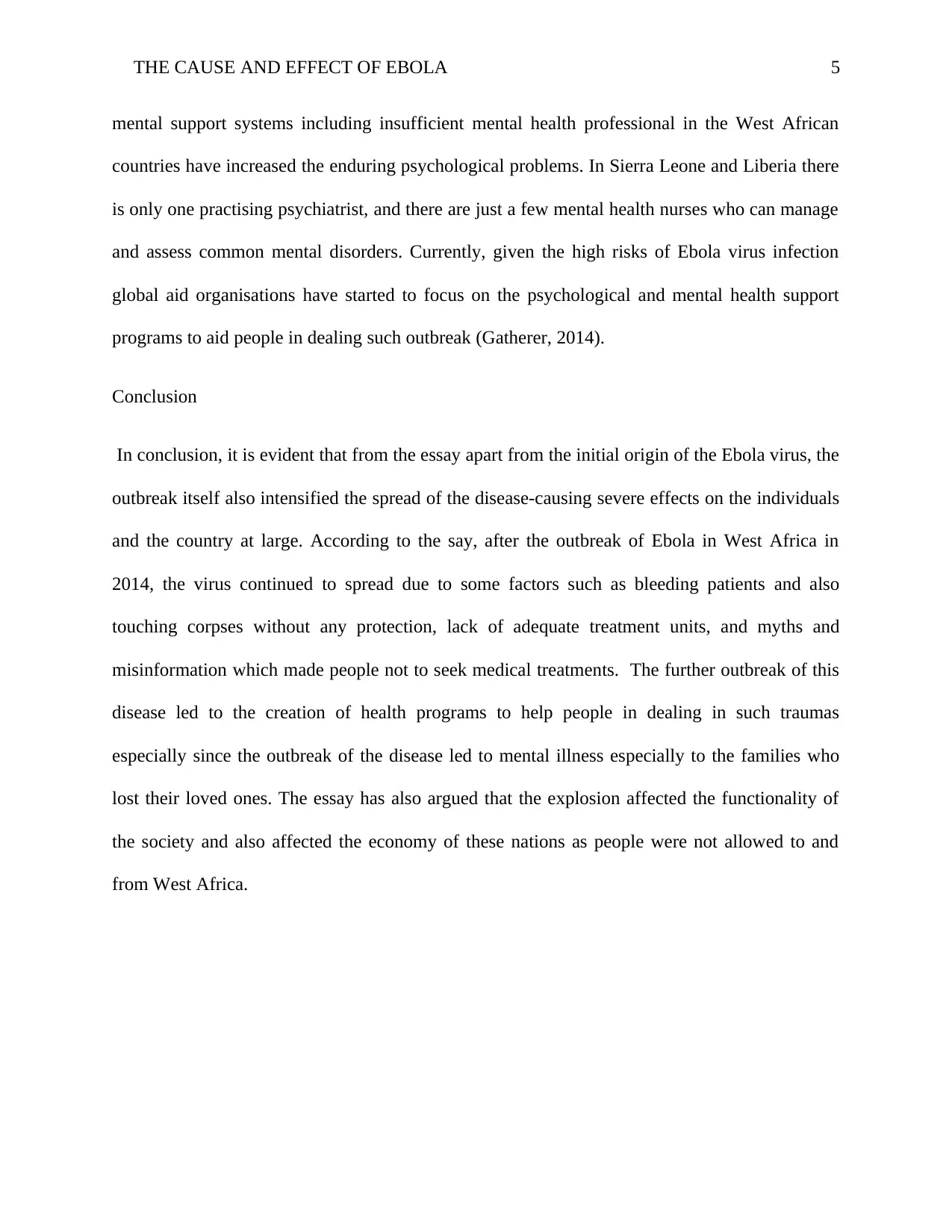
THE CAUSE AND EFFECT OF EBOLA 5
mental support systems including insufficient mental health professional in the West African
countries have increased the enduring psychological problems. In Sierra Leone and Liberia there
is only one practising psychiatrist, and there are just a few mental health nurses who can manage
and assess common mental disorders. Currently, given the high risks of Ebola virus infection
global aid organisations have started to focus on the psychological and mental health support
programs to aid people in dealing such outbreak (Gatherer, 2014).
Conclusion
In conclusion, it is evident that from the essay apart from the initial origin of the Ebola virus, the
outbreak itself also intensified the spread of the disease-causing severe effects on the individuals
and the country at large. According to the say, after the outbreak of Ebola in West Africa in
2014, the virus continued to spread due to some factors such as bleeding patients and also
touching corpses without any protection, lack of adequate treatment units, and myths and
misinformation which made people not to seek medical treatments. The further outbreak of this
disease led to the creation of health programs to help people in dealing in such traumas
especially since the outbreak of the disease led to mental illness especially to the families who
lost their loved ones. The essay has also argued that the explosion affected the functionality of
the society and also affected the economy of these nations as people were not allowed to and
from West Africa.
mental support systems including insufficient mental health professional in the West African
countries have increased the enduring psychological problems. In Sierra Leone and Liberia there
is only one practising psychiatrist, and there are just a few mental health nurses who can manage
and assess common mental disorders. Currently, given the high risks of Ebola virus infection
global aid organisations have started to focus on the psychological and mental health support
programs to aid people in dealing such outbreak (Gatherer, 2014).
Conclusion
In conclusion, it is evident that from the essay apart from the initial origin of the Ebola virus, the
outbreak itself also intensified the spread of the disease-causing severe effects on the individuals
and the country at large. According to the say, after the outbreak of Ebola in West Africa in
2014, the virus continued to spread due to some factors such as bleeding patients and also
touching corpses without any protection, lack of adequate treatment units, and myths and
misinformation which made people not to seek medical treatments. The further outbreak of this
disease led to the creation of health programs to help people in dealing in such traumas
especially since the outbreak of the disease led to mental illness especially to the families who
lost their loved ones. The essay has also argued that the explosion affected the functionality of
the society and also affected the economy of these nations as people were not allowed to and
from West Africa.
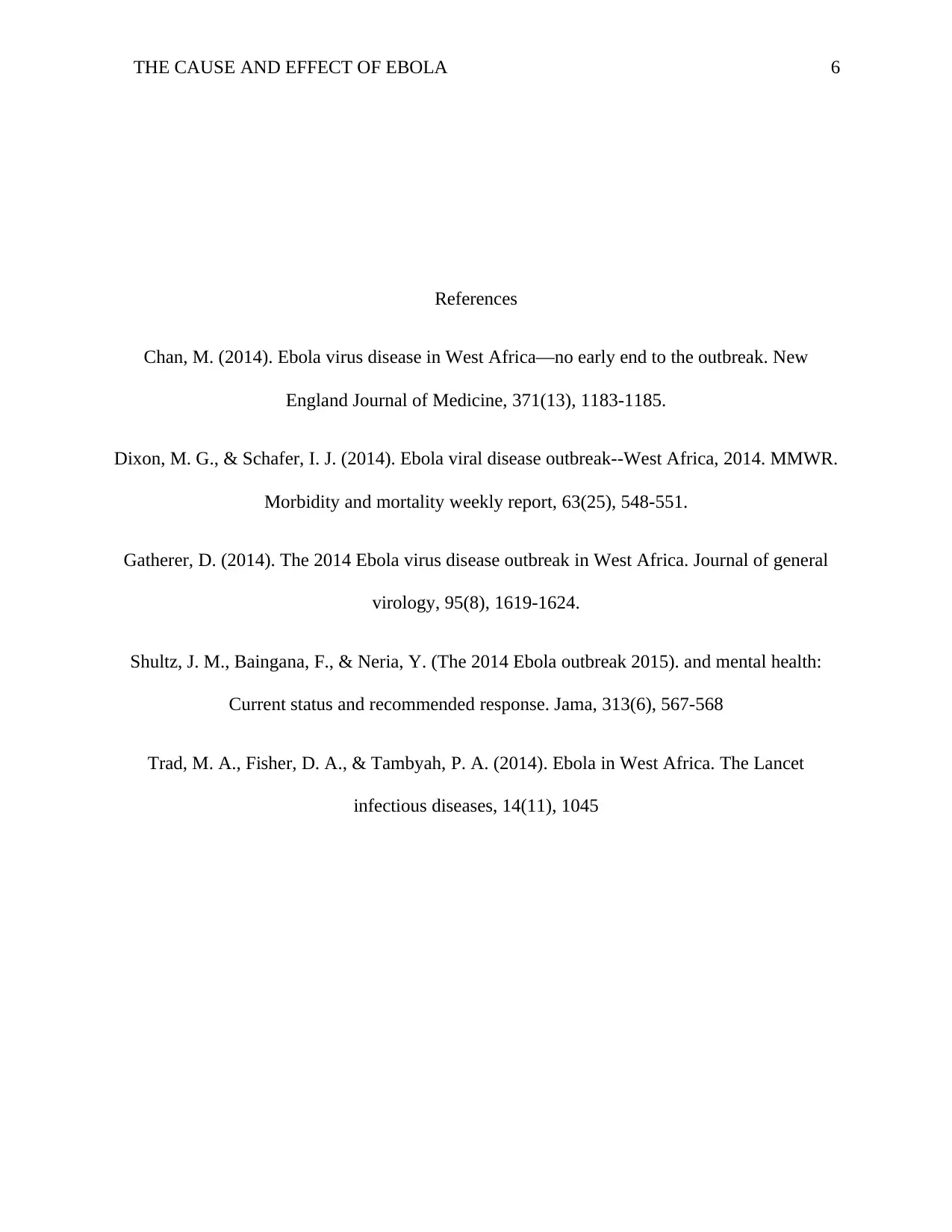
THE CAUSE AND EFFECT OF EBOLA 6
References
Chan, M. (2014). Ebola virus disease in West Africa—no early end to the outbreak. New
England Journal of Medicine, 371(13), 1183-1185.
Dixon, M. G., & Schafer, I. J. (2014). Ebola viral disease outbreak--West Africa, 2014. MMWR.
Morbidity and mortality weekly report, 63(25), 548-551.
Gatherer, D. (2014). The 2014 Ebola virus disease outbreak in West Africa. Journal of general
virology, 95(8), 1619-1624.
Shultz, J. M., Baingana, F., & Neria, Y. (The 2014 Ebola outbreak 2015). and mental health:
Current status and recommended response. Jama, 313(6), 567-568
Trad, M. A., Fisher, D. A., & Tambyah, P. A. (2014). Ebola in West Africa. The Lancet
infectious diseases, 14(11), 1045
References
Chan, M. (2014). Ebola virus disease in West Africa—no early end to the outbreak. New
England Journal of Medicine, 371(13), 1183-1185.
Dixon, M. G., & Schafer, I. J. (2014). Ebola viral disease outbreak--West Africa, 2014. MMWR.
Morbidity and mortality weekly report, 63(25), 548-551.
Gatherer, D. (2014). The 2014 Ebola virus disease outbreak in West Africa. Journal of general
virology, 95(8), 1619-1624.
Shultz, J. M., Baingana, F., & Neria, Y. (The 2014 Ebola outbreak 2015). and mental health:
Current status and recommended response. Jama, 313(6), 567-568
Trad, M. A., Fisher, D. A., & Tambyah, P. A. (2014). Ebola in West Africa. The Lancet
infectious diseases, 14(11), 1045
⊘ This is a preview!⊘
Do you want full access?
Subscribe today to unlock all pages.

Trusted by 1+ million students worldwide
1 out of 6
Related Documents
Your All-in-One AI-Powered Toolkit for Academic Success.
+13062052269
info@desklib.com
Available 24*7 on WhatsApp / Email
![[object Object]](/_next/static/media/star-bottom.7253800d.svg)
Unlock your academic potential
Copyright © 2020–2026 A2Z Services. All Rights Reserved. Developed and managed by ZUCOL.





